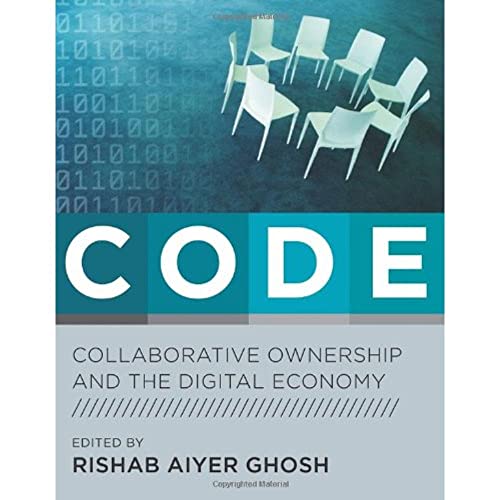
Inhaltsangabe
Open source software is considered by many to be a novelty and the open source movement a revolution. Yet the collaborative creation of knowledge has gone on for as long as humans have been able to communicate. CODE looks at the collaborative model of creativity—with examples ranging from collective ownership in indigenous societies to free software, academic science, and the human genome project—and finds it an alternative to proprietary frameworks for creativity based on strong intellectual property rights.
Intellectual property rights, argues Rishab Ghosh in his introduction, were ostensibly developed to increase creativity; but today, policy decisions that treat knowledge and art as if they were physical forms of property actually threaten to decrease creativity, limit public access to creativity, and discourage collaborative creativity. "Newton should have had to pay a license fee before being allowed even to see how tall the 'shoulders of giants' were, let alone to stand upon them," he writes.
The contributors to CODE, from such diverse fields as economics, anthropology, law, and software development, examine collaborative creativity from a variety of perspectives, looking at new and old forms of creative collaboration and the mechanisms emerging to study them. Discussing the philosophically resonant issues of ownership, property, and the commons, they ask if the increasing application of the language of property rights to knowledge and creativity constitutes a second enclosure movement—or if the worldwide acclaim for free software signifies a renaissance of the commons. Two concluding chapters offer concrete possibilities for both alternatives, with one proposing the establishment of "positive intellectual rights" to information and another issuing a warning against the threats to networked knowledge posed by globalization.
Die Inhaltsangabe kann sich auf eine andere Ausgabe dieses Titels beziehen.
Weitere beliebte Ausgaben desselben Titels
Suchergebnisse für Code: Collaborative Ownership And The Digital Economy...
Code : Collaborative Ownership and the Digital Economy
Anbieter: Better World Books, Mishawaka, IN, USA
Zustand: Good. 1st Edition. Used book that is in clean, average condition without any missing pages. Bestandsnummer des Verkäufers 15577946-6
Gebraucht kaufen
Versand innerhalb von USA
Anzahl: 1 verfügbar
Code: Collaborative Ownership And The Digital Economy
Anbieter: Half Price Books Inc., Dallas, TX, USA
hardcover. Zustand: Very Good. Connecting readers with great books since 1972! Used books may not include companion materials, and may have some shelf wear or limited writing. We ship orders daily and Customer Service is our top priority! Bestandsnummer des Verkäufers S_459825676
Gebraucht kaufen
Versand innerhalb von USA
Anzahl: 1 verfügbar
Code: Collaborative Ownership And The Digital Economy
Anbieter: Bellwetherbooks, McKeesport, PA, USA
hardcover. Zustand: Very Good. Very Good Condition- May show some limited signs of wear and may have a black line or red dot on edge of pages. Pages and dust cover are intact and not marred by notes or highlighting. Bestandsnummer des Verkäufers MIT-HC-VG-M-0262072602
Gebraucht kaufen
Versand innerhalb von USA
Anzahl: 1 verfügbar
Code: Collaborative Ownership And The Digital Economy
Anbieter: ThriftBooks-Dallas, Dallas, TX, USA
Hardcover. Zustand: Very Good. No Jacket. May have limited writing in cover pages. Pages are unmarked. ~ ThriftBooks: Read More, Spend Less. Bestandsnummer des Verkäufers G0262072602I4N00
Gebraucht kaufen
Versand innerhalb von USA
Anzahl: 1 verfügbar
Code: Collaborative Ownership And The Digital Economy
Anbieter: Phatpocket Limited, Waltham Abbey, HERTS, Vereinigtes Königreich
Zustand: Good. Your purchase helps support Sri Lankan Children's Charity 'The Rainbow Centre'. Ex-library, so some stamps and wear, but in good overall condition. Our donations to The Rainbow Centre have helped provide an education and a safe haven to hundreds of children who live in appalling conditions. Bestandsnummer des Verkäufers Z1-W-014-01347
Gebraucht kaufen
Versand von Vereinigtes Königreich nach USA
Anzahl: 1 verfügbar
CODE, COLLABORATIVE OWNERSHIP AND THE DIGITAL ECONOMY
Anbieter: Andre Strong Bookseller, Blue Hill, ME, USA
Hardcover. Zustand: Near Fine. Zustand des Schutzumschlags: very good +. First edition. 7 x 9 in. Gray cloth with silver spine lettering. Condition is NEAR FINE ; like new on all points, unmarked. DJ is VERY GOOD+ ; no price to clip, extremely clean with no wear. Science. Stax. JL. Bestandsnummer des Verkäufers 12196
Gebraucht kaufen
Versand innerhalb von USA
Anzahl: 1 verfügbar
CODE COLLABORATIVE OWNERSHIP AND THE DIGITAL ECONOMY
Anbieter: Basi6 International, Irving, TX, USA
Zustand: Brand New. New. US edition. Expediting shipping for all USA and Europe orders excluding PO Box. Excellent Customer Service. Bestandsnummer des Verkäufers ABEOCT25-284238
Code: Collaborative Ownership And The Digital Economy
Anbieter: ALLBOOKS1, Direk, SA, Australien
Brand new book. Fast ship. Please provide full street address as we are not able to ship to P O box address. Bestandsnummer des Verkäufers SHAK284238
Neu kaufen
Versand von Australien nach USA
Anzahl: 1 verfügbar
Code: Collaborative Ownership And The Digital Economy
Anbieter: Toscana Books, AUSTIN, TX, USA
Hardcover. Zustand: new. Excellent Condition.Excels in customer satisfaction, prompt replies, and quality checks. Bestandsnummer des Verkäufers Scanned0262072602
Neu kaufen
Versand innerhalb von USA
Anzahl: 1 verfügbar

